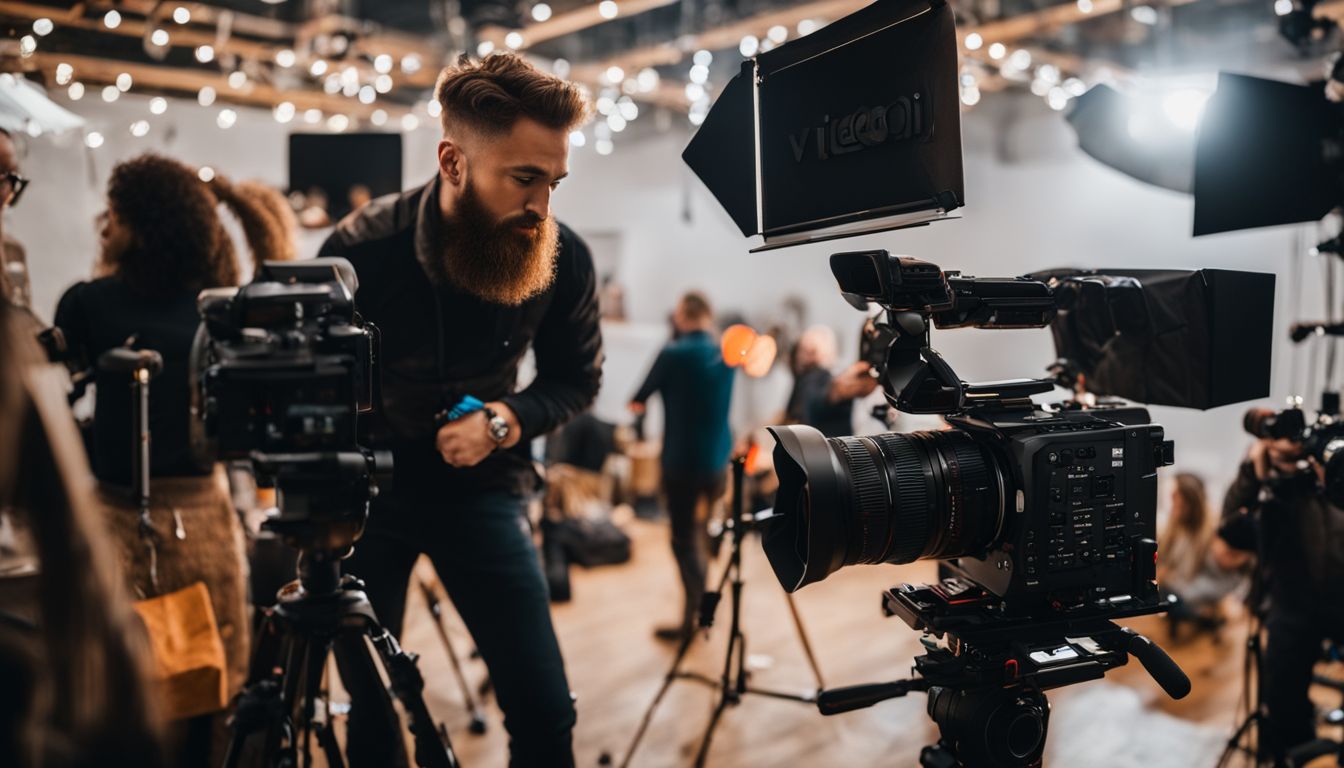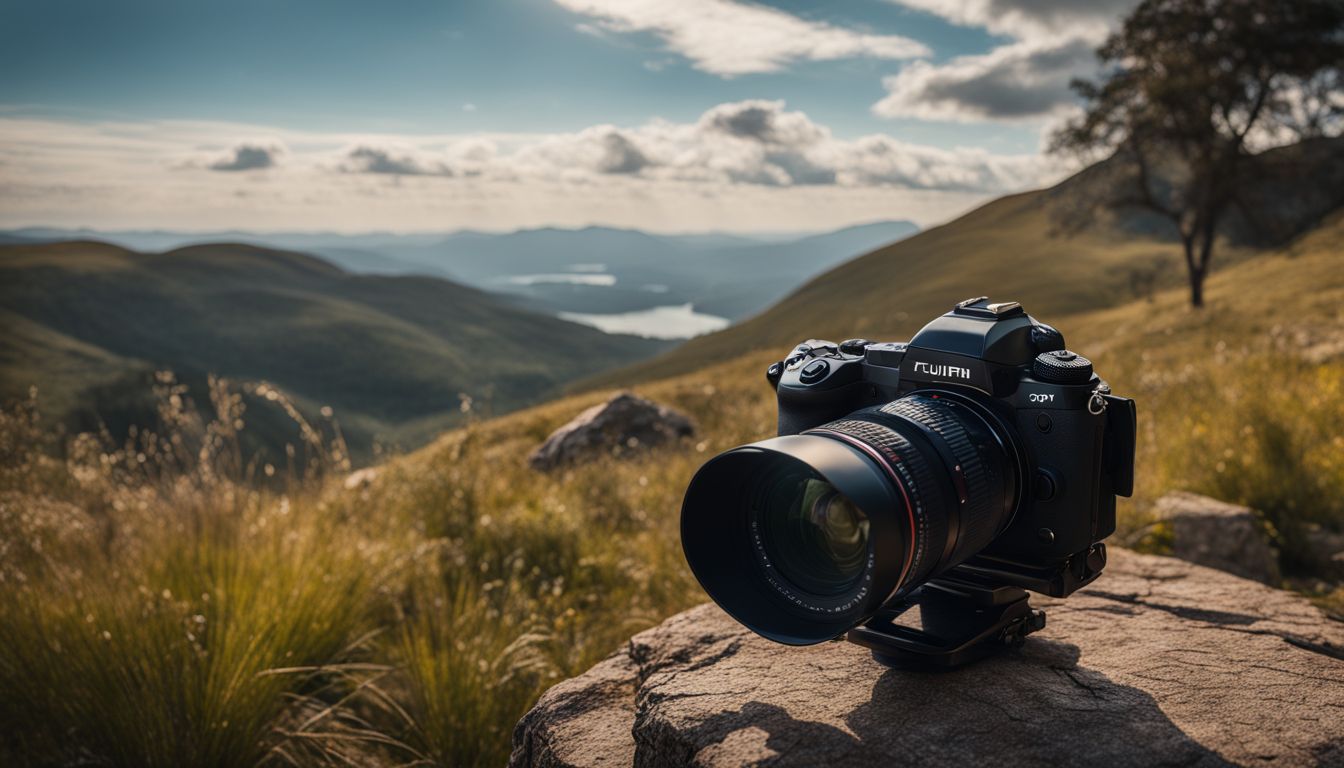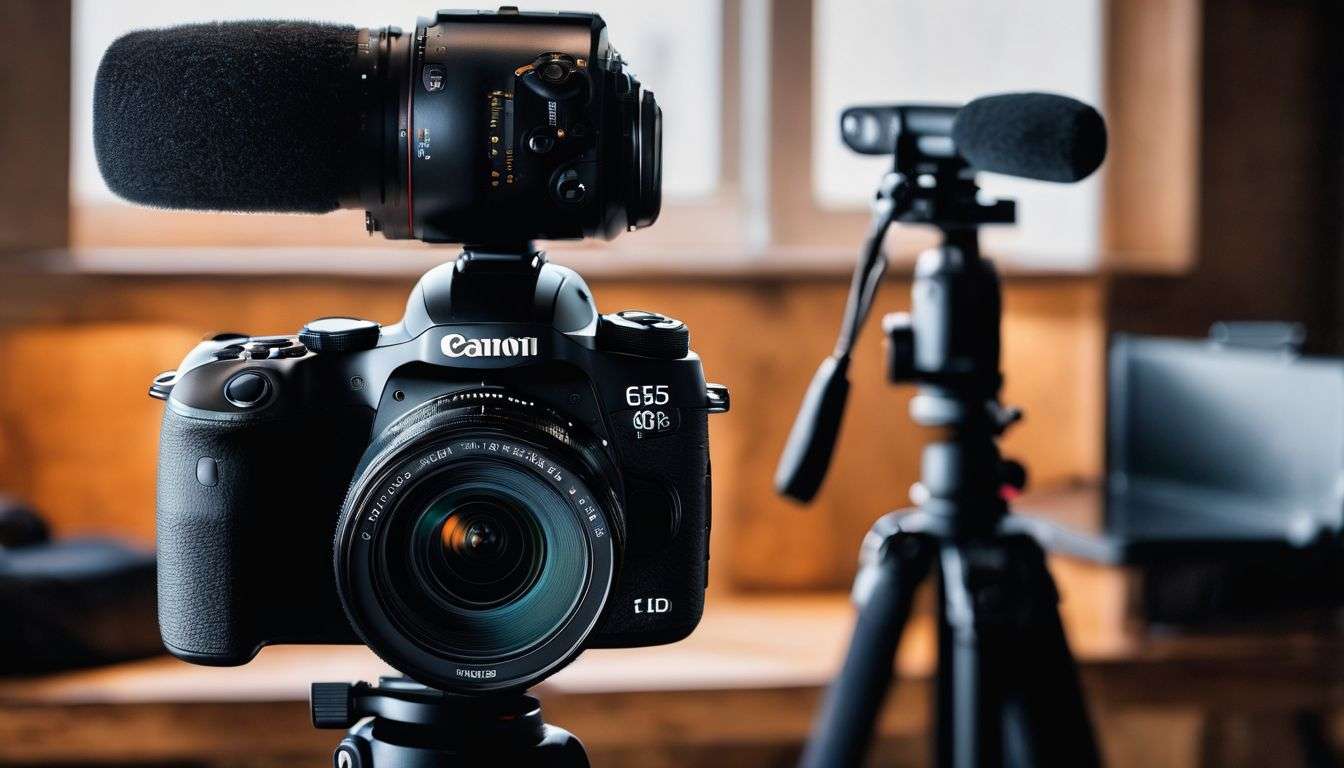Ever found yourself pondering over the role of a videographer in photography? You’re not alone! We’ve taken this intriguing query and transformed it into an explorative journey, conducting thorough research to bring you closer to the realm of videography.
This blog is your comprehensive guide, explaining the diverse responsibilities that come with this multifaceted profession. Fasten your seatbelts as we delve into a captivating world where creativity marries technicality – exploring the enthralling duties of a videographer in photography!
Key Takeaways
- A videographer in photography has diverse duties, including filming videos on set or at live locations, setting up equipment for shoots, editing footage, managing video files, and working closely with clients and team members.
- Their main role is to capture moments in time by recording events and stories with their cameras. They focus on finding the perfect angles, lighting, and backdrops for each shot to create lasting memories.
- Videographers also have technical skills in filming and editing. They set up cameras, lights, backdrops, and props to get high-quality footage. After filming, they use digital editing equipment to enhance the videos.
- Communication and teamwork skills are essential for videographers as they work closely with clients and creative teams. They discuss client requirements, plan video shoots together, ensure safety on set, collaborate effectively during projects’ progress.
What Does a Videographer Do in Photography?

A videographer in photography has many duties. One key role is filming videos on set or at live locations. They make sure all the gear for a shoot is there and working right. They work with the creative team to plan the shoot.
Safety on the set is also their job, giving out safety tools and watching over everyone.
Setting up stuff for a shoot like cameras, lights, backdrops, and props is another job they do. They need to know about video setup and shooting methods to get top quality footage.
In addition to capturing moments through film, they often edit videos using digital editing equipment to enhance what was filmed.
Managing video files comes next after editing them which might include keeping a video library organized as well. Working closely with clients and team members is part of this role too.
Good chat skills are needed so that their vision can come alive in the final product.
Photographer Videographer Job Duties

The job duties of a photographer videographer include capturing moments in time, filming and editing video footage, working with creative teams and clients, planning video shoots, and providing quality video and photography.
Capturing moments in time
We, as videographers, play a key role in capturing moments in time. Our main duty is to record events and stories with our cameras. We make sure to catch every detail while filming video footage at live locations or sets.
Our task is not just pointing and shooting the camera; we strive to find the perfect angle, lighting and backdrop for each shot.
For us, each frame matters because it tells part of a bigger story. By filming videos on set or on location, we create lasting memories that can be enjoyed again and again. Every small moment becomes part of our creative art form – videography!
Filming video footage
We film video footage on sets and live locations. We make sure all equipment works well. We set up cameras, lights, backdrops, and props for each video shoot. Our job is to get high-quality footage.
Keeping everyone safe during the shoot is very important to us too. We know many different ways to film videos which helps us get great results every time.
Editing video footage
We take the raw film and make it shine. Editing video footage is a key part of our job. We use special tools to cut and join clips together. This makes the story flow well. We also fix any errors in sound, light, or colour with these tools.
After that, we add music or other sounds if needed.
Working with creative teams and clients
Working with creative teams and clients forms a big part of a videographer’s role. In this job, there are several tasks we need to do.
- We have chats with clients about what they want. This helps us understand their vision.
- We work out a plan with the creative team. This guides us in creating the video or photo shoot.
- The client’s wish is our duty to fill. It is up to us to make sure the client gets what they want.
- Often, we must show safety gear and tell others how to stay safe on the set.
- We also need to talk through all parts of the project with other team members.
- Our goal is always for good teamwork and clear chat so that everything goes well.
Planning video shoots
Planning video shoots is a main job for a videographer. We start by talking to the creative team and all those in charge. This helps us know what they want the video to look like at the end.
- Our first step is to pick best location for filming. This could be on set or at live sites.
- Next, we check that all equipment needed for shoot are there and working fine.
- After that, we set up cameras, lights, backdrops, and other things needed for a shoot. It’s very important that we focus on the details here.
- We also plan how to capture each moment during the shoot as this greatly affects final product.
- Safety of everyone present on site during filming is key so we have safety gear ready and make sure everyone uses it.
- We keep open lines of talk with our clients and team members before and during shoots. This makes sure we can give them exactly what they want.
- After shooting, we might edit films or clips using special tools on our computers.
Providing quality video and photography
We strive to provide top-notch video and photos. Our team makes sure that every shoot results in a high-quality product. We use the best cameras, lights, and tools for every job. We also keep our eyes keen to capture the best moments on film or in a photo.
After filming, we work hard to edit the videos until they are perfect. Every step of our process aims at one thing – quality! Quality video and photography is our promise to you.
Photographer Videographer Job Requirements
To excel in this role, a keen eye for detail, technical skills in filming and editing, creativity and artistic vision, strong communication and teamwork skills, and the ability to meet deadlines are all essential.
Discover more about the requirements of being a successful photographer videographer.
Keen eye for detail
A videographer in photography needs to have a keen eye for detail. They must pay close attention to every aspect of the video shoot, from framing the shots to capturing the right angles.
This attention to detail ensures that they capture all the important moments and create visually appealing footage. It also helps them spot any issues or inconsistencies in the video, allowing them to make necessary adjustments during filming or editing.
A keen eye for detail is crucial in producing high-quality videos that meet the client’s expectations and convey their intended message effectively.
Technical skills in filming and editing
We need to have good technical skills in filming and editing as videographers. This means we must know how to operate cameras, set up lighting, and position ourselves for the best shots.
We also need to understand different shooting techniques and angles to capture high-quality footage. In addition, we should be proficient in using digital editing software to enhance the video after filming.
By having these technical skills, we can ensure that our videos look professional and meet the desired standards of our clients or creative team.
Creativity and artistic vision
Creativity and artistic vision play a crucial role in the duties of a videographer in photography. As videographers, we need to have a keen eye for detail and be able to see the potential for capturing beautiful shots and moments.
Our creativity allows us to think outside the box and come up with unique angles, compositions, and visual storytelling techniques that bring the footage to life. We strive to create visually stunning videos that showcase our artistic vision while also meeting the production and organizational goals of our clients or creative teams.
By combining technical skills with our creativity, we are able to produce high-quality video content that captivates audiences and conveys powerful messages.
Communication and teamwork skills
Good communication and teamwork skills are crucial for videographers in photography. We need to work closely with our clients and creative team to understand their vision and deliver the desired final product.
It is important that we effectively communicate our ideas, listen to feedback, and collaborate with others throughout the entire process. By having strong communication skills, we can ensure that everyone is on the same page and working towards the production goals.
This also helps in building positive relationships with clients and team members, leading to successful projects. Additionally, being a part of a collaborative team requires us to be adaptable, flexible, and open-minded so that we can work together efficiently and achieve optimal results.
Ability to meet deadlines
Meeting deadlines is a crucial aspect of the videographer’s job in photography. We understand that it is important to deliver high-quality videos and photographs on time as per the client’s expectations.
This requires excellent time management skills and the ability to work efficiently under pressure. Whether it’s filming, editing, or organizing video files, we prioritize meeting deadlines to ensure a smooth workflow and customer satisfaction.
By staying organized, communicating effectively with team members, and prioritizing tasks, we make sure that all projects are completed within the given timeframe.
Photographer Videographer Work Environment
Photographer videographers work in a variety of settings, including live locations and sets where they collaborate with event and marketing teams. Discover more about the dynamic work environment of a photographer videographer by reading on.
On live locations
On live locations, videographers are responsible for capturing footage in real-time. They need to set up cameras, lighting, and other equipment to ensure they get the best shots. They must also be aware of their surroundings and adapt quickly to changing conditions.
Whether it’s a wedding, a sports event, or a documentary shoot, videographers need to be prepared for any situation that arises during filming. They work closely with the rest of the team to coordinate shots and make sure everything runs smoothly.
It’s important for videographers to have good communication skills so they can direct subjects and capture the desired moments effectively.
On sets
On sets, videographers play a crucial role in capturing moments and filming video footage for photography projects. They work closely with the creative team and stakeholders to plan the shoot and ensure that all necessary equipment is set up and working properly.
Videographers are responsible for maintaining safety standards on set, providing safety equipment, and monitoring the environment for a safe working experience. They use their knowledge of video setup and shooting techniques to capture high-quality footage using cameras, lighting, backdrops, and props.
After filming, they may also be involved in the editing process to enhance the final product. Communication skills are essential as they collaborate with clients and team members to understand their vision and deliver the desired outcome.
Collaborating with event and marketing teams
Collaborating with event and marketing teams is an important aspect of a videographer’s job in photography. This involves working closely with these teams to understand their goals and objectives for the video project. Here are some key ways in which videographers collaborate with event and marketing teams:
- Discussing the video requirements: Videographers meet with event and marketing teams to discuss the purpose of the video, target audience, messaging, and desired outcomes. This helps them understand the overall vision and goals for the project.
- Planning the shoot: They collaborate on planning the logistics of the shoot, including location scouting, scheduling, and coordinating with other team members involved in the production.
- Incorporating branding elements: Videographers work closely with marketing teams to ensure that the video aligns with the brand identity. This includes incorporating specific logos, colors, fonts, or other branding elements as required.
- Capturing key moments: They collaborate during live events to capture important moments that align with the event or marketing objectives. This may involve filming speeches, presentations, interviews, demonstrations, or other significant moments that highlight the event’s purpose.
- Delivering on expectations: Throughout the production process, videographers keep open lines of communication with event and marketing teams to ensure that their expectations are met. They provide regular updates and seek feedback to make any necessary adjustments.
Photographer Videographer Salary & Outlook
The average salary range for a photographer videographer is competitive, with opportunities for growth and advancement in the field. The employment outlook for videographers in photography is promising, as more businesses and individuals are recognizing the value of high-quality video content in their marketing strategies.
Average salary range
As videography is a specialized skill within the photography field, videographers can expect to earn a competitive salary. The average salary range for videographers in photography varies depending on factors such as experience, location, and the size of the company.
As per industry reports, entry-level videographers typically earn around £20,000 to £25,000 per year. With more experience and expertise, that figure can increase up to £40,000 or more annually.
Freelance videographers have the potential to earn higher rates by charging on a project basis. It’s worth noting that rates may also differ based on the specific area of focus within videography and the demand for those skills in the market.
Employment outlook
When it comes to the employment outlook for videographers in photography, it’s important to note that there is a growing demand for professionals in this field. With the increasing popularity of video content on various platforms like social media and online streaming services, businesses and individuals are seeking skilled videographers to create engaging and high-quality videos.
Additionally, events like weddings, parties, and corporate gatherings continue to require professional videography services. This means that job opportunities for videographers are expected to be favorable in the coming years.
It’s also worth mentioning that as technology continues to advance, new avenues for videography will likely emerge, providing even more employment prospects in this industry.
How to Become a Photographer Videographer
To become a photographer videographer, gaining experience and building a portfolio is crucial. Pursuing formal education or training can also enhance skills and knowledge in filming and editing.
Networking is essential for finding job opportunities in the industry.
Gaining experience and building a portfolio
To become a photographer videographer, gaining experience and building a portfolio are crucial steps. This involves taking on various projects to showcase your skills and creativity.
You can start by offering your services to friends, family, or local businesses at discounted rates or even for free. This will allow you to practice different filming techniques and create a diverse portfolio of work.
Additionally, you can join photography or videography groups online or in your community to connect with other professionals and learn from their experiences. Attending workshops or courses related to videography can also help you improve your technical skills and expand your knowledge base.
Building a strong portfolio will not only demonstrate your capabilities but also attract potential clients who are looking for reliable and skilled photographers videographers.
Pursuing formal education or training
To become a videographer in photography, it can be beneficial to pursue formal education or training. Many colleges and universities offer programs specifically designed for aspiring videographers.
These programs provide a solid foundation in video production techniques, cinematography, editing software, and storytelling strategies. Additionally, there are vocational schools and online courses that focus on practical skills like camera operation and video editing.
Gaining this formal education or training not only enhances technical knowledge but also provides opportunities to network with industry professionals and build a portfolio of work.
Networking and finding job opportunities
To find job opportunities as a videographer in photography, networking is crucial. Building connections with professionals in the industry can help you learn about potential job openings and gain valuable insights.
You can attend industry events, workshops, and conferences to meet people working in the field. Additionally, joining online communities and forums for photographers and videographers allows you to connect with like-minded individuals and stay updated on relevant job postings.
It’s also important to have an up-to-date portfolio showcasing your skills and previous work samples that you can share with potential employers or clients. By actively networking, you increase your chances of finding job opportunities and expanding your career in photography.
Conclusion
In conclusion, the duties of a videographer in photography are diverse and exciting. They capture moments, film videos, edit footage, and work closely with creative teams and clients.
With their keen eye for detail and technical skills in filming and editing, they bring valuable contributions to the production process. Videographers play an important role in creating high-quality video content that meets the goals and expectations of clients.
What is the Difference Between a Cinematographer and a Cameraman in Filmmaking?
A crucial difference between a cinematographer and a cameraman lies in their roles and responsibilities within filmmaking. While a cameraman mainly operates the camera, a cinematographer is involved in the overall visual storytelling process. They focus on lighting, composition, and camera techniques to create the desired mood and atmosphere in a film. The difference between cinematographer and cameraman is essentially the level of artistic and technical involvement in the cinematography of a film.
What Role Does Audio Recording Play in a Videographer’s Duties?
Audio recording techniques for videography play a crucial role in a videographer’s duties. Capturing high-quality sound is essential to complement the visual experience, ensuring a professional and seamless final product. By understanding and utilizing various audio recording techniques, videographers can enhance the overall audiovisual impact of their videos, resulting in a more immersive viewer experience.
FAQs
1. What does a videographer in photography do?
A videographer in photography captures and records videos for various purposes, such as events, documentaries, or promotional content.
2. What skills does a videographer need?
A videographer needs skills in operating video cameras, setting up shots, framing shots creatively, editing videos, and using audio equipment.
3. Do I need any qualifications to become a videographer?
While formal qualifications are not always necessary, having knowledge of camera techniques and video editing software can be beneficial in becoming a successful videographer. Practical experience is also valuable.
4. Where do videographers work?
Videographers can work in various settings such as weddings, corporate events, television production companies, advertising agencies, or freelance.
5. How much does a videographer earn?
The earnings for a videographer can vary depending on factors such as location, experience level,
and the type of projects they undertake.
FAQ
What are the key considerations for a videographer when engaging with an online community?
A videographer should focus on understanding the communitys interests and content style preferences, engage actively by responding to comments and feedback, share behind-the-scenes insights to create a personal connection, collaborate with influential members or content creators within the community, and consistently deliver high-quality content that resonates with the audience.
How can a videographer gain experience in a competitive online environment?
To gain experience, a videographer should start by creating and sharing content regularly to build a portfolio, volunteer or take on low-budget projects to improve skills, seek mentorship from experienced professionals, participate in online forums or groups related to videography for learning opportunities, and stay updated with industry trends through webinars or online courses.
What lighting techniques are essential for producing high-quality video content?
Essential lighting techniques include three-point lighting (key light, fill light, back light) for proper subject illumination; using soft lights to avoid harsh shadows; understanding color temperature; utilizing natural light effectively; and experimenting with creative lighting setups like silhouetting or backlighting for mood and depth.
How does proper lighting enhance the viewers experience of video content?
Proper lighting enhances viewer experience by ensuring clear visibility of subjects, setting the tone and mood of the scene, highlighting important details or features, providing depth to visuals which increases engagement and immersiveness, reducing eye strain for viewers during watching sessions.
What equipment should a beginner videographer invest in to improve their lighting setup?
Beginner videographers should invest in basic but versatile equipment such as softbox lights for diffused even lighting; reflectors to bounce natural light or fill shadows; LED panels for adjustable color temperatures; affordable ring lights for direct illumination especially useful in vlogging; and possibly a basic set of gels or filters to creatively modify color tones.






